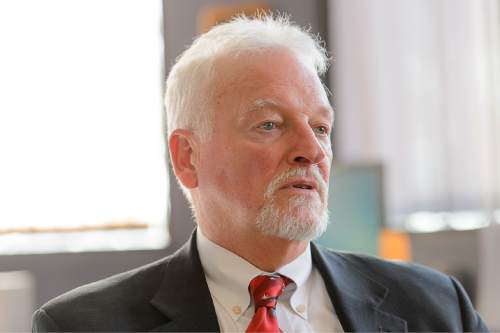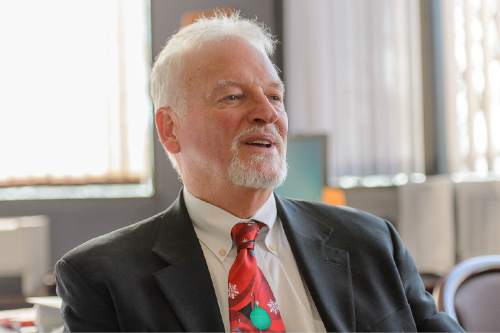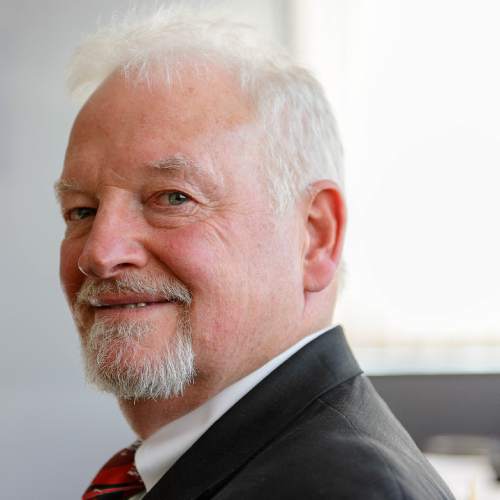This is an archived article that was published on sltrib.com in 2014, and information in the article may be outdated. It is provided only for personal research purposes and may not be reprinted.
Retirement does not mean Pat Fleming is giving up the fight to help people with mental-health and substance-abuse issues get the treatment they need to be contributing members of society.
To the contrary, Salt Lake County's retiring director of the Division of Behavioral Health expects to be just as busy off the clock, volunteering for advocacy organizations such as the National Alliance on Mental Illness (NAMI) Utah and the Utah Support Advocates for Recovery Awareness (USARA).
And if the Legislature passes some version of Gov. Gary Herbert's Healthy Utah plan in lieu of federal Medicaid expansion, Fleming plans to be at the county jail for as long as he's needed, signing up newly eligible inmates for health-care benefits that could turn their lives around and, he firmly believes, save society a lot of money in the long run.
"We've had 60 years of failed policy of dealing with people with addiction disorder," said Fleming, 65, whose retirement becomes official Dec. 31.
"Every year we wait, more and more people die. These are real people dying, lives that are being wasted. Once we treat them and get them on their feet, they often turn into good members of society," he added. Too often, addiction-driven felony drug convictions trap people at a young age and become a burden for the rest of their lives "and they're locked out of the American dream."
Fleming's passion for his cause is well recognized at the County Government Center, where he recently received two standing ovations when Mayor Ben McAdams and the County Council honored him with a resolution recognizing his work.
"Without question, his commitment has improved people's health, helped preserve families and saved lives," McAdams said. "Pat is one of the master designers of a collaborative health-care model that to this day sets Salt Lake County and Utah apart in the nation for its effective delivery of behavioral health services to our residents."
Fleming is proud of the system he helped put in place. Every three years, the private and nonprofit service providers who care for clients across the continuum of disorders are required to bid anew for their contracts.
"They're continually trying new things, keeping costs under control so they can get their contract for the next cycle," Fleming said, noting that county contracts (largely involving pass-through of federal money) amount to $85 million annually.
Fleming's way of doing business has the wholehearted support of Adam Cohen, CEO of Odyssey House of Utah for nearly 15 years.
"Salt Lake County has one of the more progressive substance-abuse systems in the nation and credit goes to Patrick Fleming in developing a system that has services for as many individuals as possible and really meets the demands of the community," he said. "Treatment has better outcomes than sticking someone in jail. He has made that point really well to local officials in Salt Lake County — and the nation often looks to us for how it's working here."
"We are very sad that he is moving on," Cohen added.
Fleming enters this new phase of his career secure in the knowledge he has the respect of the people he is representing. "It's a real privilege to get to know those people and be accepted by the recovering community," he said. "They're such warm and thoughtful and spiritual people."
That perception comes from a lifetime of seeing, from somewhat different perspectives, how mental-health or substance-abuse issues figured into societal problems.
He saw it initially as director of a nonprofit organization's domestic-violence program, then as a behavioral-health specialist in Utah County, helping to establish a methadone clinic to deal with heroin addiction. Fleming's mastery of the intricacies of Medicaid funding began during his tenure in the state Department of Social Services, where he saw more evidence of mental health and substances driving welfare and food-stamp needs.
Upon moving to Salt Lake County, he established treatment programs for women addicted to methamphetamine.
Fleming said he was fortunate to have good mentors along the way — state human services officials Leon PoVey and Norm Angus, to name a couple — who were forward-thinking in recognizing addiction "is a biological thing, not a moral failing" and pragmatic financiers who recognized that, as Fleming put it, "when you're working with public dollars, you have to make sure every dollar counts."
His sense of compassion grew from knowing two good people, Lou and Ellen Callister, who devoted their lives to helping people and families dealing with addiction after losing one of their sons to it.
"They said 'If this can happen to us, it can happen to everybody,' and that was the beginning of getting this out of the shadows," Fleming said. "I was lucky to be able to deal with them on this."
He also takes comfort believing that the next generation of advocates is up to the challenge.
"The people now working in the field, the 30- and 40-year olds actually helping those in need, they're really good," Fleming said, led by his close colleague of the past few years, Tim Wahlen.







